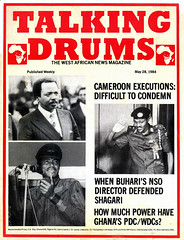Are we better off today? That is the question
Anis Haffar
In the process of rapid changes of governments in Ghana by means of guns instead of the ballot box, the country, according to this writer, has suffered a crippling damage which continues to haunt all its efforts of rehabilitation. So he asks the obvious question: are we better off today after all these years?During the Limann administration when Professor George Benneh -- then Ghana's minister of economic planning introduced his budget proposals, the assembly found the programme lacking in substance and rejected them. The West Africa called the budget "no big deal for Ghana's economy". Also in the article, "The Ghana cedi: quality is the key," (Africa Now, Dec 81) I wrote:
"The vehicle for Ghana's economic progress will not move until the President finds a key to a cedi of value, money Ghanaians can trust, a durable unit of account for making future plans, an anchor of stability, a cedi that is literally as good as gold.
Those days the official rate remained $1 to 2.75. The floating market rate was $1 to C40. Things seemed pretty bad, and Professor Benneh himself appeared and sounded confused at times. Still the economic minister had a lot going for him: he had the mandate of the people and the respect that came with it. Moreover the opposition did not overthrow his government, neither was the state apparatus ruined. Alternative economic measures were discussed and new proposals were offered by the representatives. Benneh must have considered the feedback for his second try at the economic programme. Those were the days, my friends; and that was progress in action.
Today we have the few, the know-it-all, the emotionally involved who preferred to go unopposed professing the wisdom of Solomon. The results of such actions are there, clear for all to see: both the official and free market rates of the cedi have sunk out of control. Even the experts have lost count. The recent devaluation has been widely guessed to be 99% or 990%. Does it make any difference which one? We are being asked this question in more ways than one.
I did not cite this as a mere observer looking in a dispassionate fashion at interesting differences in human character. But the fact of tyranny and military dictatorship which we witness today affected the citizens of my country including our mothers and fathers, grandparents, and the children too.
Looking at institutions and processes of government, interconnection between law and practice, norm and behaviour, the measure of success will not be whether one leader was better than the other, not that one party was better than another, but the effectiveness and stability under which the nation was run. This would be called freedom. Further, it is a birthright and a duty to be free.
For all out contemporary intents and purposes, we are almost struggling for a new kind of self determination: this time from elements of negative government. Osagyefo's famous words may now read: seek ye first the national stability and everything else shall be added unto you.
ABOUT VIOLENCE
The People's National Defence Council (PNDC), the Workers' Def ence Committee, the supreme military's new improved council: what ever may be the headings used or the new formulas introduced, not since the matemeho/CPP era - when simple folk beat each other up, and murdered when they could - has there been such escalated violence in Ghana's history. No phraseology can substitute for the reality.To tell the truth, the rate of executions could increase. Just think about it: what will stop any person, concerned and emotionally involved from picking up arms and shooting their way through the broadcasting house, and spilling blood along the way? Believe it or not, these are the standards being set out today - the atheists' method of salvation.
People are talking about "getting even" not only in Ghana but in Nigeria and other parts of West Africa as well. It didn't have to come to this, not in the least. In the last resort, we all want the same things.
If we wish to describe the phenomenon precisely, what we are witnessing is nothing short of the replacement of certain species of men by another set who become privileged actors with the grandiose glare of cheap floodlights thrust upon them. But beyond the seemingly tough military stance of control, they have in fact hidden their personal and intellectual defects behind some fabricated quasi-civilian facade. It has become that way.
The naked truth evokes for us the blasting of bullets which come from such plays. We are witnessing our societies being turned upside down. Had Frantz Fanon been alive today, he would not hesitate to identify the colonial soldier, instituted to go between, "come of age" to perpetuate the rule of imperial suppression. Fanon could thus state seriously:
"the colonial soldier(s), by their immediate presence and their frequent and direct action maintain contact... by means of rifle butts with the clear conscience of an upholder of the peace; yet he is the bringer of violence into the home."
This discovery need shake our world in a necessary way. The soldiers of old had their rightful place in society. They protected the stool. They did not deface it.
